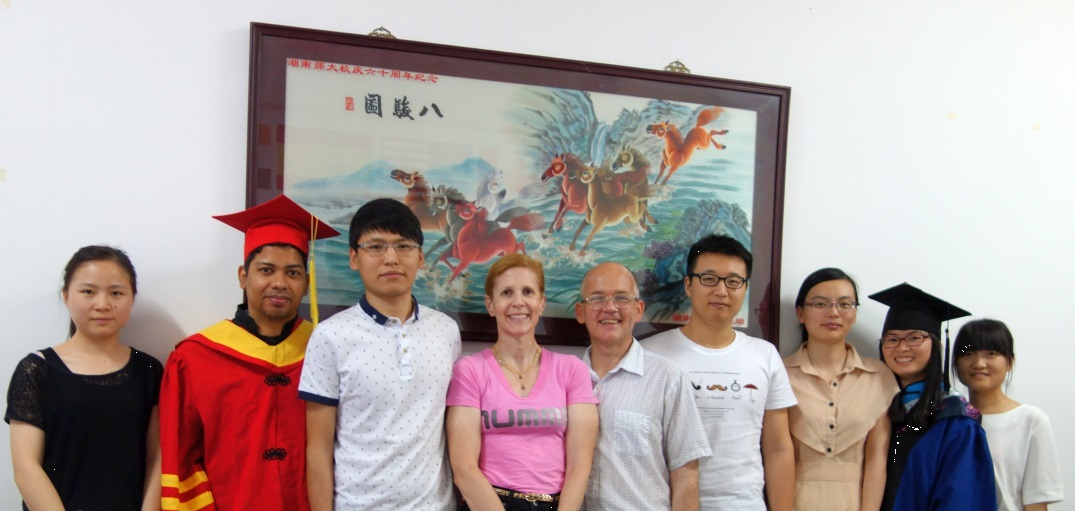
Professor Jenkins, what is your research area?
Topological approaches to chemistry and physics. Indeed anything at all where the nuclear coordinates are used and over used, reactions, bond torsion etc. There is a lot of information assessable in the total charge density distribution r(r) via the various topological approaches that is not currently being used.
What brought you to China?
The freedom to pursue what I thought an academic career could be and not what it actually was in Europe. Ironically, having more freedom to follow what seemed initially to be rather abstract avenues of research (quantum topology) has led to more collaborations and more meaningful collaborations. For instance, now we are able to add a new theory to the now standard experiment+simulation formula. The standard formula is OK for the experimentalists but it has meant a real narrowing of horizons for the former theory researchers that are forced into the simulation area and cannot develop their own research identities.
In Europe, I had a track record of winning industrial funding and the industry partners were happy with our research. But there was little long-term benefit for the researcher since it was impossible to build a research identity only within the confined applied research that the companies wanted. This is despite the research being published in ACS journals and even specially selected virtual articles. In China, I have the freedom to pursue more basic research in this way.
In China, a diversity of research activity is encouraged, from basic research to industrial. Diversity is essential for the health of any eco-system! My European collaborators are keen to collaborate with the BEACON research group on our new ideas and it helps me as I am not a subject specialist, so I can collaborate with bio-chemists, catalysis chemists and even nuclear physicists! I plan to stay in China for the foreseeable future.
What Chinese sources do you get funding from? What are their strengths and limitations?
I was awarded funding from National Natural Science Foundation of China (NSFC) and the Hunan Provincial Government (100 Talent Plan). The strengths of both the national and provincial sources of funding are in the flexibility and freedom to explore basic research. Tightly controlled time plans are not required and there is even a section in the end of year report that allows, realistically, for readjustments in the research plan should they be required. The 100 Talent Plan can only be awarded once.
Are there also non-funding related challenges?
Integration has really not been an issue at all. I am free to have an international research group containing British, Chinese, Iranian, Colombian students and researchers. I can also collaborate with Chinese researchers both in the college and in China. The Chinese government through the China Scholarship Council will fund any non-Chinese Nationals to do a PhD with me. My first non-Chinese PhD student Julio Roman Maza, from Colombia, has just graduated.
Before I came to China our research was very specific to a particular company and not widely recognized. Recently, however, we found out that the work is to be included as part of a review article in Science magazine entitled "Non-additivity of Nanoparticle Interactions". Although we now prefer to have the freedom to also pursue more basic research.
How can we enhance the mobility of European researchers to China and vice versa?
That is easy; by funding more of our workshops so that more researchers can come or send their PhD students and or post-doctoral fellows. This could include funding the travel for the European researchers to visit the BEACON group in China. A reciprocal arrangement could also be made.
In China, just like in Europe, the different provinces have different traditions and cultures. Hunan has a strong hospitality culture. Hunan is also strongly driven to increase its internationalisation profile; I have discussed this matter with the Hunan Provincial Government as part of the planning for next years, and their recruitment drive for overseas scientists is strong.
What are your long-term plans?
A long term plan for Hunan could be an institute for new thinking and creativity in the natural sciences, perhaps like the Isaac Newton Institute for Mathematical Sciences in Cambridge, UK. This would serve as a long term base for the exchange of researchers to Hunan from around the world, Europe in particular, since there is so much theoretical knowledge there. This knowledge will be lost soon if we don't encourage some balance in research activities. Pure theoretical research is very rare now. This institute would not be for technology or spin-offs, but only theoretical research. We would try to create a free-thinking science culture and atmosphere that existed for the arts in Paris in the late eighteenth century. The proposed institute could be initiated by a combination of myself, the Hunan Government including the Bureau of Foreign Expert Affairs as well as the State Administration of Foreign Expert Affairs in Beijing.
Thank you very much, Professor Jenkins!
...
Samantha Jenkins comes from the UK (Scotland). Her background is in Theoretical Physics (BSc Hons), Applied Mathematics (MSc) at Exeter University and Theoretical and Computational Chemical Physics (PhD), postdocs at Sussex University and McMaster University, Canada and a Docent in Chemical Physics. She also has a track record of winning industrial funding (6.96 million Swedish Krona).
She is the group leader of BEACON at the Hunan University in Changsha.

The BEACON group from left to right; Minxing Hu, Dr. Julio Roman Maza, Dong Jiajun, Professor Samantha Jenkins, Professor Steven Robert Kirk, Tianlv Xu, Yuning Xu, Chenxia Xiao, Huan Guo.
BEACON group is based at Hunan Normal University’s College of Chemistry and Chemical Engineering (CCCE).
BEACON also develops Scientific Communication tools for students and PhD candidates.
